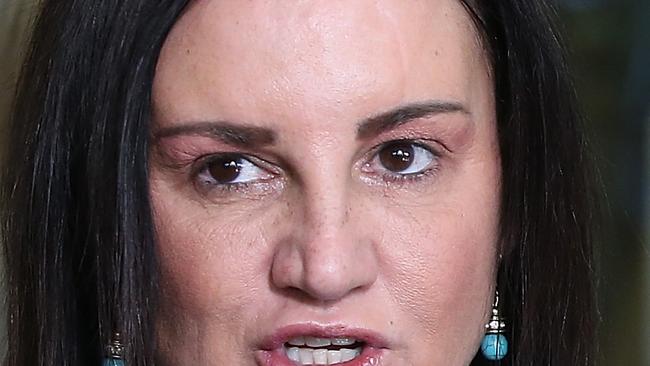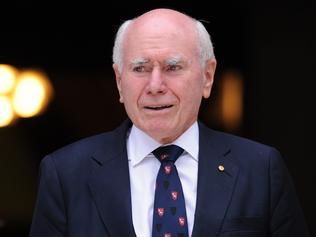Leaders slam Scott Morrison’s tax as ‘populist attack’ on big banks
Mike Smith says Scott Morrison’s tax on big banks was more suited to governments in ‘Africa and South America’.

Former ANZ chief executive Mike Smith has hit out at Scott Morrison’s proposed $6.2 billion hit on the four major banks and Macquarie Group, likening it to a policy more suited to governments in “Africa and South America”.
His comments come as executives of the five banks are expected to warn senior Treasury officials in Sydney and Melbourne this morning that the new tax will result in either higher lending rates across business and housing loans, or trigger a cut to dividends.
The nation’s leading bank executives — including Westpac chairman Lindsay Maxsted, financial system inquiry head David Murray and former National Australia Bank boss and one-time BHP Billiton chairman Don Argus — lined up to echo Mr Smith’s scathing assessment.
But Mr Smith, who memorably said in 2010 that then-opposition Treasury spokesman Joe Hockey had been taking economic lessons from the Venezuelan socialist leader Hugo Chavez, reprised the comparison. “The tax, because that’s what it is, is reminiscent of less well-managed countries in Africa and South America,” he told The Australian. “Where does it all stop? On and on it goes.”
Mr Argus said the levy reminded him of the debacle surrounding the implementation of the Resources Super Profits Tax, introduced by the then Labor government in 2010.
He said it would affect the banks’ cost of capital, with clear implications for major projects such as the industry’s frequent technology updates.
“The other big question is who’s going to be next (to have a levy imposed?)” Mr Argus said.
Bank shares consolidated losses of recent days, although ANZ closed up slightly. Commonwealth Bank closed down 0.4 per cent, Westpac was off 0.7 per cent, NAB was down 0.7 per cent and Macquarie ended down 0.6 per cent.
Brokerage Deutsche Bank estimated the tax would slash the net profit of each bank next year in a range of 3-6 per cent, assuming the impost was not passed on to customers.
ANZ, he said, could be the most heavily affected of the banks because its profitability was lower and it had more deposits from institutional and offshore sources.
The major banks declined to quantify the expected impact. However, NAB chief executive Andrew Thorburn said the tax “cannot be absorbed” and rather would be borne by NAB’s customers, shareholders, suppliers and employees.
In a statement, Macquarie said it needed further details to clarify the effect the proposed tax would have on its business. It is the only investment bank included in the banks that will pay the tax.
Mr Maxsted said the direct feedback from the investment community was that the tax represented an “attack” on shareholders.
Mr Murray said the tax made “no economic sense”, while Mr Argus wondered which industry or companies would be targeted next for punitive tax treatment.
The government has proposed raising $6.2bn from a levy on banks with liabilities greater than $100bn, indexed to grow in line with nominal GDP.
The levy will be calculated quarterly at an annualised rate of six basis points on corporate bonds, commercial paper, certificates of deposit and tier-two capital instruments, but will not apply to tier-one capital and insured deposits of individuals and businesses.
The ability of the banks to share the burden between shareholders and customers was open to question yesterday, given the government’s instruction to the competition regulator to undertake a residential mortgage pricing inquiry until the middle of next year.
Either way, Mr Murray said the measure made no economic sense. If it were passed on to bank customers, he said, it would be equivalent to a 15-25 basis point rise in interest rates at the same time that the government had announced a “mildly expansionary” budget.
“And if it’s not passed on, you’re stripping capital out of the banks when they have to build up their capital buffers to be unquestionably strong,” the system inquiry chief said.
“It underscores the purely political nature of it.”
Mr Maxsted lashed out at the tax. “It came out of nowhere and there is no justification for it, other than that the budget has been mismanaged, there’s a hole to fill and we have the capacity to pay,” he said.
The Westpac chairman said the initiative amounted to an attack on the finances of the five banks’ shareholders.
“We’re strong and we’ll get through this,” he said.
“But I’ve been meeting shareholders (of toll-road company Transurban, of which he is also chairman) today, and that’s certainly how they see it — an unwarranted attack on them. “Everything is reactionary now (in politics); nothing’s considered”.
While the government has justified the imposition of the tax by pointing to similar moves in other countries, such as Britain, Mr Maxsted said any comparison was unwarranted.
“The UK has banks and we’re banks — that’s where the similarity ends,” he said.
“They bailed out their banks in the financial crisis, but there was absolutely no suggestion of that here. Yes, the funding guarantees were introduced, but that was good policy because other governments were doing it and our system partly relies on offshore wholesale funding.”
The head of the financial system inquiry David Mr Murray said the levy made no economic sense. Mr Smith, a British-born banker recruited by ANZ from HSBC, agreed with Mr Maxsted that Britain was no precedent for the government’s revenue grab. Mr Smith famously steered HSBC’s Argentine operations through the collapse of the nation’s banking system during the 1990s.
If it were passed on to bank customers, he said, it would be equivalent to a 15-25 basis point hike in interest rates at the same time that the government had announced a “mildly expansionary” budget.
“And if it’s not passed on, you’re stripping capital out of the banks when they have to be unquestionably strong,” Mr Murray said.
“It underscores the purely political nature of it.”
He also stressed that there were no bank bailouts in Australia, and said there was a strong argument that the British bank tax had been a drag on GDP and business lending.
“What it has raised has also been lost so it hasn’t had the desired effect,” Mr Smith said.
“This is all about a populist agenda — our politicians should be thinking hard about policy and not just about politics.”
Brokerage Macquarie yesterday downgraded its rating of the Australian banking sector to neutral, from overweight, cutting CBA and NAB shares to underperform and Westpac to neutral.
“Based on the Treasury estimates this levy will raise around $1.6bn (net of tax), which we estimate will slash 4-5 per cent of the majors’ earnings,” the investment bank said.
Morgan Stanley analysts noted that, while they saw an opportunity for banks to offset the impact of the levy through lower rates on deposits and/or higher rates on mortgages, it would be a tough ask given the rising scrutiny from Canberra.



To join the conversation, please log in. Don't have an account? Register
Join the conversation, you are commenting as Logout